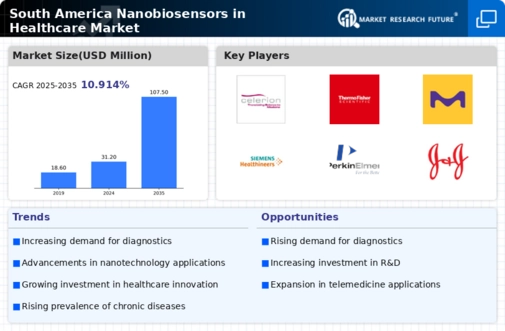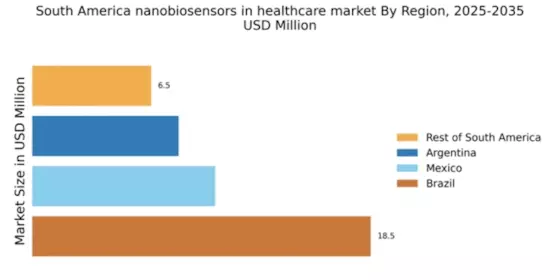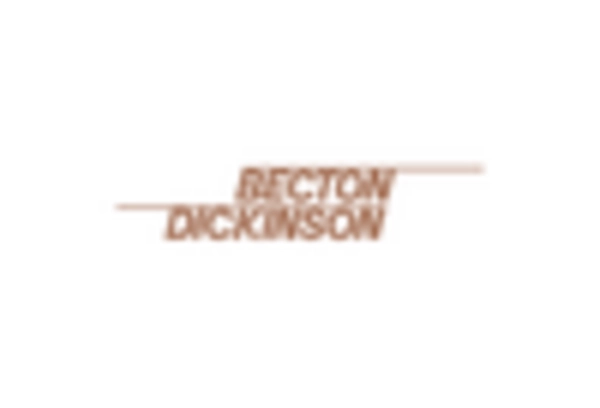Advancements in Nanotechnology
Recent advancements in nanotechnology are significantly influencing the nanobiosensors in-healthcare market. Innovations in materials science and engineering have led to the development of highly sensitive and specific biosensors capable of detecting biomarkers at extremely low concentrations. For example, the integration of nanomaterials such as graphene and gold nanoparticles has enhanced the performance of biosensors, making them more effective for clinical applications. The South American market is witnessing a surge in research and development activities, with investments in nanotechnology expected to increase by 20% annually. This growth is likely to foster collaborations between academic institutions and healthcare companies, facilitating the commercialization of cutting-edge nanobiosensor technologies. As a result, the market is anticipated to experience robust growth, driven by the demand for innovative diagnostic solutions that leverage the latest advancements in nanotechnology.
Rising Prevalence of Chronic Diseases
The increasing incidence of chronic diseases in South America is a pivotal driver for the nanobiosensors in-healthcare market. Conditions such as diabetes, cardiovascular diseases, and cancer are becoming more prevalent, necessitating advanced diagnostic tools. For instance, the World Health Organization reported that non-communicable diseases account for approximately 77% of all deaths in the region. This alarming statistic underscores the urgent need for innovative healthcare solutions. Nanobiosensors, with their ability to provide rapid and accurate diagnostics, are well-positioned to address this growing demand. The market for these sensors is projected to expand significantly. It may potentially reach a valuation of $1.5 billion by 2027, driven by the need for effective disease management and monitoring. As healthcare providers seek to enhance patient outcomes, the adoption of nanobiosensors is likely to accelerate, further propelling market growth.
Rising Demand for Personalized Medicine
The growing emphasis on personalized medicine in South America is likely to propel the nanobiosensors market. As healthcare moves towards tailored treatment approaches, there is an increasing need for diagnostic tools that can provide precise and individualized information about patients' health. Nanobiosensors offer the potential to analyze biomarkers specific to individual patients, enabling healthcare providers to make informed decisions regarding treatment plans. The market for personalized medicine is projected to grow at a compound annual growth rate of 15% over the next five years, reflecting the increasing integration of advanced diagnostics in clinical practice. This trend is expected to drive the demand for nanobiosensors, as they play a critical role in the development of personalized therapeutic strategies, ultimately enhancing patient care and treatment efficacy.
Increased Focus on Preventive Healthcare
The shift towards preventive healthcare in South America is emerging as a significant driver for the nanobiosensors market. With rising healthcare costs and a growing awareness of the importance of early disease detection, there is a notable trend towards preventive measures. This paradigm shift is prompting healthcare providers to seek out technologies that facilitate early diagnosis and monitoring of health conditions. Nanobiosensors, known for their rapid and accurate detection capabilities, are well-suited to meet this demand. The market is expected to grow as healthcare systems increasingly prioritize preventive strategies, potentially leading to a market valuation of $1.2 billion by 2026. This focus on prevention not only enhances patient outcomes but also reduces the overall burden on healthcare systems, further driving the adoption of nanobiosensors.
Growing Investment in Healthcare Infrastructure
The expansion of healthcare infrastructure in South America is a crucial driver for the nanobiosensors market. Governments and private entities are increasingly investing in healthcare facilities, aiming to improve access to quality medical services. According to recent reports, healthcare expenditure in the region is projected to grow by 10% annually, reflecting a commitment to enhancing healthcare delivery. This investment is likely to create a conducive environment for the adoption of advanced diagnostic technologies, including nanobiosensors. As healthcare facilities upgrade their capabilities, the demand for efficient and rapid diagnostic tools is expected to rise. Consequently, the nanobiosensors market may benefit from this trend, as healthcare providers seek to implement innovative solutions that can improve patient care and operational efficiency.

















